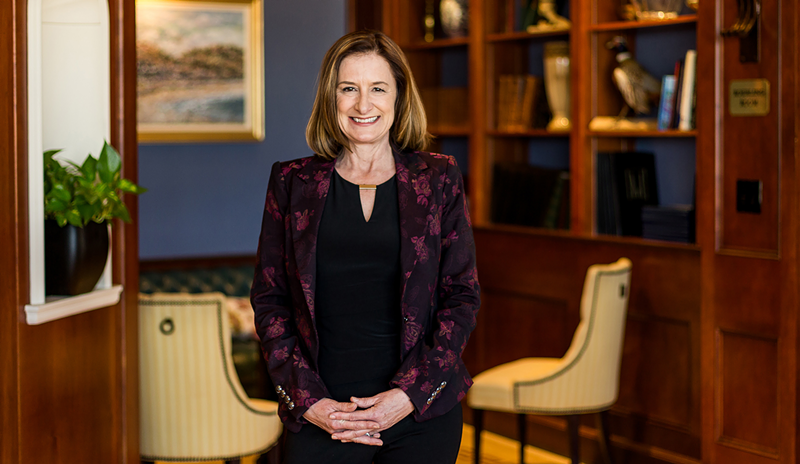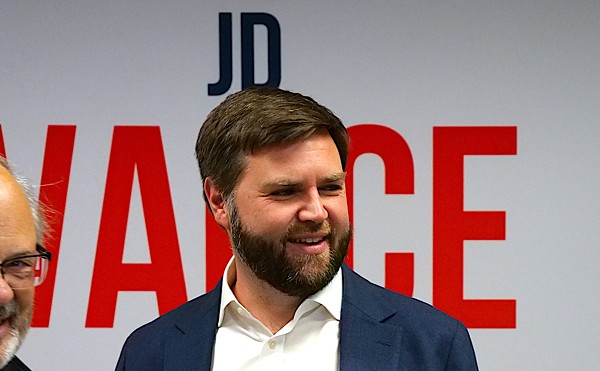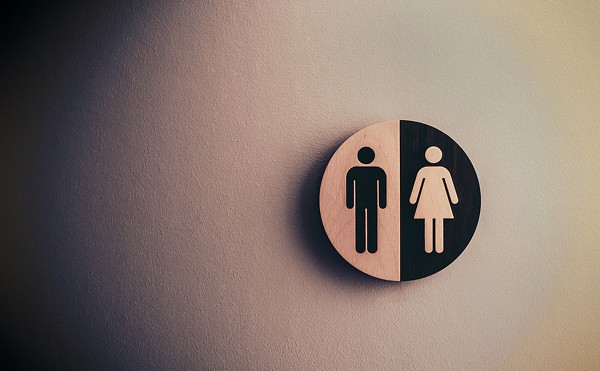Bellevue’s Patti Piatt concedes she has at least one thing in common with U.S. Rep. Thomas Massie, the staunch libertarian from whom she’d like to take Kentucky’s 4th Congressional District U.S. House seat in the upcoming November election.
“We’re both carbon-based,” she quips. But beyond that, their political similarities are scarce. Will voters in Massie’s district, who voted overwhelming for Trump in 2016, opt for a change?
Piatt wants to increase federal funding to the suburban and rural district, reign in the nation’s lax gun laws and gradually push toward a single-payer healthcare system. Massie, on the other hand, has made a name for himself as a sort of real-life Ron Swanson. Like the conservative Parks and Recreation character, Massie believes the less the government does, the better it is.
True to his small-government, state’s-rights principles, the Massachusetts Institute of Technology-educated engineer-turned-Eastern-Kentucky-cattle-farmer-turned-politician typically votes down spending proposals, even on hurricane disaster relief funds for Harvey, Irma and Maria, and regularly introduces “constitutional purist” legislation like eliminating the Department of Education and the Environmental Protection Agency.
Piatt has taken issue with Massie’s hands-off approach. She is seeking to unseat the three-time incumbent on promises she’ll be a more proactive advocate in Congress for the district that stretches from a portion of Louisville into eastern parts of the commonwealth and runs along the Ohio River through Northern Kentucky’s suburban Boone, Campbell and Kenton counties.
“He doesn’t believe in federal funding for anything,” Piatt says of Massie. “There are no dollars coming into Kentucky because of him.”
Piatt has promised potential constituents that she’ll help send funds Kentucky’s way in support of infrastructure, rehabilitation programs and teacher-driven education policies.
Should she pull off the upset, she would make history. As female candidates, Piatt and fellow primary contender Christina Lord are both pushing against a deeply rooted dearth of women in Kentucky Politics. While the Bluegrass State elected one of the first female governors in the nation (Martha Layne Collins) back in 1983, women make up less than a fifth of Kentucky’s General Assembly.
If Piatt or Lord advance past the primary and unseat Massie, either would be the first woman to represent Kentucky’s 4th Congressional District and the first Democratic woman in Kentucky elected to Congress. The state has had only two women representing it at the Capitol — both Republican — during its history. The first, Katherine Gudger-Langley, took office 90 years ago. The last, Anne Northup, was first elected two decades ago and left office in 2007.
Piatt isn’t running in a vacuum: Democrats are eyeing Republican-held congressional seats across the country as they attempt to take back control of Congress on an anti-Trump wave.
Last Wednesday, moderate Pennsylvania Democrat Conor Lamb celebrated a slim victory over Republican contender Rick Saccone in a special House election in a district that elected Donald Trump to his presidency by a 20-point margin. Race results are not yet official, but Democrats nationwide are hopeful this is just the beginning of red district flips.
That will be especially difficult in Kentucky, University of Cincinnati Professor of Political Science Dr. David Niven says.
“Trump won the 4th by 36 points. This is an even more Republican, more Pro-Trump district, and unlike what we saw in Pennsylvania, this district lacks the strong organized labor base that helped push the Democrat over the top,” he says.
“The 4th is a much steeper hill to climb for Democrats and not one of the dozens of districts the party is targeting to take back the House in 2018,” Niven added.
But Piatt isn’t the only one who wants to sign up for the tough job of painting this deep red district blue. To challenge Massie, she will need to get past primary challengers Lord, of Milford, Ky., and Seth Hall, from La Grange, Ky.
Like Piatt, Lord brings a business-administration background to the table. While she’s served in various management roles, she currently directs her energy at being a stay-at-home parent, but says she “has always desired to serve in a larger capacity than volunteering with extracurricular activities to ensure our children could have those activities to participate in.”
Hall, a lawyer in the healthcare industry, is running to ease divisions in the 4th district. On his campaign website, he matter-of-factly states that everyone is entitled to quality healthcare, a fair wage and a first-class education.
Only one will continue after the May 22 primary election. There are no Republican candidates challenging Massie.
Piatt has spent the days since her launch working her way around the district, dropping into restaurants and school board meetings to spread her message and engage in conversation with residents.
Back in February, for example, Piatt held a campaign event at Tom’s Papa Dino’s Pizza in Florence, Ky. She addressed the crowd with a short stump speech before launching into individual dialogues with attendees concerned about minimum wage raises (Piatt would like to slowly work toward $15 an hour, but cautioned that business owners cannot sustain a fast-track model), veteran-related issues, the opioid crisis and gun control reform.
That last issue offers a very clear prism through which to view the distance between Massie and Piatt.
Following the mass shooting in Parkland, Fla. in February, Piatt released a statement calling for an immediate ban on assault and military-style weapons, increased investment in mental healthcare and the repeal of the Dickey Amendment, a law that prohibits the Centers for Disease Control and Prevention (CDC) from using funds “to advocate or promote gun control.”
Massie, who chairs the House Second Amendment Caucus, had an equally clear response, albeit one far different from Piatt’s. On his personal platforms and with larger media outlets, he pointed to the Safe Students Act bill he introduced in January 2017. That legislation, which hasn’t passed, would repeal the Gun-Free School Zones Act of 1990.
In addition to pushing back against pleas by Democrats and some Republicans to raise the minimum age to purchase an assault weapon, Massie proposed the SAFER Voter Act, which would reduce the minimum age to buy a handgun from 21 to 18, reasoning on twitter, “Why should a 20-yr-old mom be denied the right to defend herself?”
“Statistically speaking, a 20-year-old mother is more likely to be killed by an abusive partner when there is a gun in the house than she is to use that gun to protect her home and children,” Piatt tweeted in response to Massie’s tweet.
There’s a personal connection to the mental health angles that have emerged from the debate on gun control. Having lost a son to suicide, addressing mental health issues and destigmatizing addiction is a personal quest Piatt says she plans to take to Washington, D.C.
Political experts say Piatt’s chances of taking Massie’s seat are slim — but that anything is possible in the current climate.
Ask Xavier University Political Science Professor Dr. Mack Mariani about Piatt’s odds and he’ll tell you it “seems like the longest of long shots. Of course, 2016 should teach us that nothing is certain in American politics these days.”






